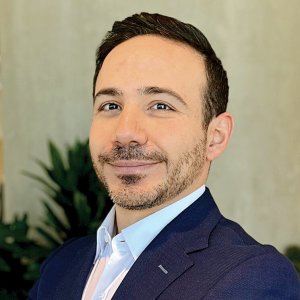Refugees: An Unexplored Workforce in Mexico

STORY INLINE POST
Q: What is the foundation of INTRARE’s proposition for the Mexican market?
A: We started operations in 2018 and quickly realized that most Mexicans were unaware of the number of refugees and asylum seekers the country had, especially because nobody was talking about it. Many refugees who came into the country were being exploited for labor. While over half of refugees did not find employment at all, those who got a job were earning 37 percent less than a local in the same position.
We want to incentivize companies to formally hire more migrant workers because the evidence shows that refugees provide better retention rates and have amazing motivation and flexibility. These characteristics increase a company’s productivity and workplace diversity. Working with refugees also represented many opportunities for us because when we first started, there were basically no companies hiring them.
Q: What are the most common misconceptions held by Mexican companies regarding refugees as potential employees?
A: Most companies think that refugees are not allowed to work in the country or that they lack the necessary documents to be hired. Another misconception is that migrants come to the country to steal jobs from Mexicans. These assumptions are wrong. First, refugees have legal migratory documents that allow them to work in the country. Second, refugees have diverse profiles that complement the workforce available in Mexico, especially for the retail, customer service and operational positions that companies have trouble filling.
Q: How receptive have Mexican companies been to INTRARE and how has the comany helped to ease xenophobic concerns?
A: Our priority has been to explain to companies that the person who they are hiring left their country for external reasons. They are some of the most resilient people that I have ever known, especially because of their life experiences. Even when companies hire refugees that come from outside of INTRARE, we are more than happy to assist and help them through the hiring process.
Companies have been open about hiring refugees, possibly because many company founders are migrants from other countries and are willing to give them opportunities.
Q: How does your business model coexist with the current migration policy in Mexico?
A: The flow of refugees to Mexico is constantly growing and pressures from the US on Mexico are reinforcing that trend. The Mexican government is facing constant pressure to receive more refugees and to ensure that they do not cross the US border. The Mexican government’s handling of this situation has been impressive as it quickly adapted, despite the few resources it has at its disposal.
Obtaining legal documents for taxes, such as a Federal Registry of Contributors (RFC) number, is becoming harder, which puts economic pressure on migrants because most of them do not have social support networks. If they have to wait for six months before they can earn an income to support their needs, they might turn to informal jobs, which can lead to exploitation. This is, without a doubt, the largest challenge for refugees in starting formal employment and integrating in Mexico.
Q: How does INTRARE advocate for refugees and asylum seekers?
A: It is essential for refugees to be able to create a new home for themselves and a job is the basis to do so. They need a steady income and a social environment in which they can make friends and feel they are part of a community. We support refugees directly providing them training and preparing them for starting a new job, and placing them with job opportunities in our partner companies. We also ensure they can receive psychological and legal support.
We are at a point in which companies are understanding the benefits of hiring more diverse talent, which is the key to increasing the hiring levels for refugees and migrants. We hope that in the next two or three years, more ambitious metrics will be taken into account to understand the advantages that diversity brings to a company.
Q: What does INTRARE mean when it uses “mathematical optimization and automation processes” to transform inclusion?
A: This process began when we saw that companies were struggling to integrate refugees, sometimes because the companies had not adjusted their recruitment processes. Migrants cannot always bring their educational certificates with them if they are fleeing. The lack of a Mexican passport also leaves them out of the hiring process. For that reason, we decided to create a platform that acts as an intermediary and provides the best outcomes for both employers and employees.
We have experts in mathematical optimization and AI on the team that built an algorithm understanding and delivering the key indicators that both parties need. We ensure all refugees receive the best job recommendations, and send the best candidates to employers. We also boost diversity by ensuring that every candidate meets certain thresholds, helping employers get a more diverse workforce.
Q: What are the inside processes that companies must complete to support talent diversity within their organization?
A: There is definitely a learning curve. We offer companies training in diversity, inclusion and equity, which really helps to strengthen the overall commitment at all levels of the company. There is a large area of opportunity in the implementation of these processes.
Q: What principal objectives will be guiding INTRARE’s strategic roadmap in 2023?
A: Our first objective is to improve the hiring experience that companies have with us. We are rolling out the job placement platform that optimizes candidate placement for employers. We want to ensure that it is as easy as possible for a company to hire these candidates. Secondly, we will increase partnerships with companies that want to have a great impact. Mexico received 130,000 asylum seekers just last year, and together with ambitious employers, we can impact a growing number of them.
Migration has always divided society politically. We are trying to show that migrants and refugees become part of our societies and contribute to them from the moment they arrive in a new country. We should use that as a force for good, especially in the face of populist governments.
INTRARE, founded in 2018, is a social startup that provides groundbreaking integration services to refugees and asylum seekers, facilitating their entrance into Mexico’s labor market.








 By Cinthya Alaniz Salazar | Journalist & Industry Analyst -
Fri, 09/23/2022 - 10:16
By Cinthya Alaniz Salazar | Journalist & Industry Analyst -
Fri, 09/23/2022 - 10:16
















